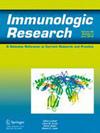IGF2BP2通过调节LOX1和肿瘤相关的中性粒细胞促进肺腺癌的进展。
摘要
肺腺癌(LUAD)是肺癌的常见形式,易发生远处转移。IGF2BP2是一种m6A修饰调节因子,在肺癌组织中上调,但它在LUAD肿瘤微环境(TME)中的具体作用尚不清楚。我们探讨了 IGF2BP2 在 LUAD 进展过程中的作用。我们通过生物信息学、Western 印迹和免疫组织化学方法评估了 IGF2BP2 在 LUAD 患者标本和对照组中的表达。建立了LUAD皮下和正位异种移植肿瘤模型,以及肿瘤相关中性粒细胞(TANs)和A549细胞共培养系统。功能测定评估了IGF2BP2在IGF2BP2抑制剂JX5治疗下的作用。机理测定探索了 293T 细胞中 IGF2BP2 与 LOX1 之间的相互作用。IGF2BP2在LUAD组织中明显上调,表达水平越高,预示着患者的预后越差(p < 0.001)。在皮下和正位异种移植模型中,使用 IGF2BP2 抑制剂 JX5 治疗可缩小肿瘤大小、体积和重量(p < 0.001)。JX5 还能明显降低外周血中促炎细胞因子的浓度(p < 0.01 和 p < 0.001)。流式细胞术分析表明,JX5 减少了 TME 中的 CD11b+Ly6G+/CD45+ 细胞(TANs)(p < 0.001)。从机理上讲,JX5 下调了 LOX1 在体内的表达,共培养实验进一步证明,IGF2BP2 通过 LOX1 介导的 TAN 活性调节促进了 LUAD 的进展(p < 0.01 和 p < 0.001)。过表达 LOX1 逆转了 JX5 对 TAN 浸润、肿瘤细胞活力和凋亡的抑制作用(p < 0.01 和 p < 0.001)。此外,RNA免疫沉淀显示,IGF2BP2与LOX1 mRNA的m6A修饰位点结合,稳定LOX1并增强其在TME中的功能。敲除 IGF2BP2 会加速 LOX1 mRNA 降解,这证实了它在维持 LOX1 稳定性方面的作用(p < 0.01 和 p < 0.001)。IGF2BP2通过m6A修饰识别并稳定LOX1,有助于TAN介导的LUAD进展。总之,这些发现为了解 LUAD 的进展提供了新的视角,并证明 IGF2BP2 是促进肿瘤进展的关键调控因子,突出表明 IGF2BP2-LOX1 轴是 LUAD 的潜在治疗靶点。Lung adenocarcinoma (LUAD) is the common form of lung cancer and is prone to distant metastasis. IGF2BP2, an m6A modification regulator, is upregulated in lung cancer tissue, but its specific role within the LUAD tumor microenvironment (TME) is unknown. We explored the role of IGF2BP2 in the progression of LUAD. IGF2BP2 expression in LUAD patient specimens and controls was evaluated through bioinformatics, Western blot, and immunohistochemistry. LUAD subcutaneous and orthotopic xenograft tumor models were established, alongside a co-culture system of tumor-associated neutrophils (TANs) and A549 cells. Functional assays assessed IGF2BP2's role under treatment with JX5, an IGF2BP2 inhibitor. Mechanistic assays explored the interaction between IGF2BP2 and LOX1 in 293T cells. IGF2BP2 was significantly upregulated in LUAD tissues, with higher expression levels predicting worse prognosis for patients (p < 0.001). In subcutaneous and orthotopic xenograft models, treatment with JX5, an IGF2BP2 inhibitor, reduced tumor size, volume, and weight (p < 0.001). JX5 also significantly reduced the concentrations of pro-inflammatory cytokines in peripheral blood (p < 0.01 and p < 0.001). Flow cytometry analysis indicated JX5 reduced CD11b+Ly6G+/CD45+ cells (TANs) in the TME (p < 0.001). Mechanistically, JX5 downregulated LOX1 expression in vivo, and co-culture experiments further demonstrated that IGF2BP2 promotes LUAD progression through LOX1-mediated regulation of TAN activity (p < 0.01 and p < 0.001). Overexpression of LOX1 reversed the inhibitory effects of JX5 on TAN infiltration, tumor cell viability, and apoptosis (p < 0.01 and p < 0.001). Additionally, RNA immunoprecipitation revealed that IGF2BP2 binds to LOX1 mRNA at its m6A modification site, stabilizing LOX1 and enhancing its function in the TME. Knockdown of IGF2BP2 accelerated LOX1 mRNA degradation, confirming its role in maintaining LOX1 stability (p < 0.01 and p < 0.001). IGF2BP2 recognizes and stabilizes LOX1 through m6A modification, contributing to TAN-mediated LUAD progression. Overall, these findings offer new insights into LUAD progression and demonstrate that IGF2BP2 is a key regulator that promotes tumor advancement, highlighting the IGF2BP2-LOX1 axis as a potential therapeutic target for LUAD.

 求助内容:
求助内容: 应助结果提醒方式:
应助结果提醒方式:


